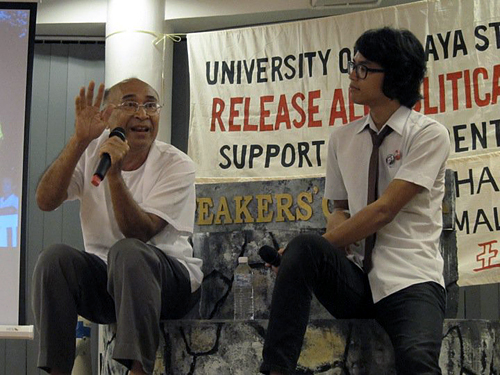
STUDENT activism in Universiti Malaya thrived in the 1960 and early 1970s. One of the key student leaders was Syed Hamid Ali who was University of Malaya Students’ Union (Umsu) general-secretary from 1967 to 1969, before he was elected president for the 1969 to 1970 term.
Syed Hamid’s activism inadvertently began because he couldn’t be a doctor. Even though he was accepted to study medicine in an Indian university in the 1960s, his family could not afford to send him. Unable to fulfil his dreams, he fell into a state of depression.
His brother Dr Syed Husin Ali then encouraged him to study in Universiti Malaya (UM) instead. Syed Hamid joined UM in 1965 and a doctor there encouraged him to be involved in activities that would help him get his mind off his past disappointments. He ended up joining Umsu, and together with union mate, Khong Kim Hoong, led a vibrant student movement.
Syed Hamid later became the secretary-general of Parti Sosialis Rakyat Malaysia in the 1970s. Former Prime Minister Tunku Abdul Rahman would subsequently accuse him of being a communist in his book May 13: Before and after even though Syed Hamid has always been a socialist. However, to avoid arrest under the Internal Security Act (ISA), Syed Hamid went into hiding and subsequently joined the underground.
He returned to the country in December 1992 and now lives in his hometown in Batu Pahat, Johor. Syed Hamid spoke to The Nut Graph about his days as a student activist and the challenges involved in a phone interview on 9 Aug 2010.
TNG: How did you get involved in the student movement?
Syed Hamid Ali: I was a half-hearted student in my first year and I had to repeat it the next year. I spent a lot of time brooding over the past, so our students’ doctor told me to keep myself busy and get involve in students activities.
So I decided to join the student council. The former Umsu general-secretary advised me to go for a big post, but I did not expect to win because most of the student leaders then were students from famous schools. I was just a poor student from a small town in Batu Pahat.
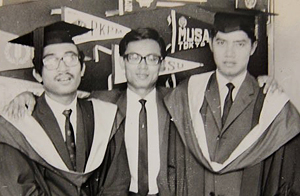
To my astonishment, I won handsomely and became the general-secretary. I was fortunate to have contemporaries like Khong (Kim Hoong who was then deputy president). We did not know each other very well, but they were all dedicated people and we worked together as a team.
Before we took over, Umsu was more like a social organisation. It focused on organising functions like weekend dances and helping first-year students look for accommodation. But the first thing I did when we took over was to do away with the credit system in the student union canteen.
You see, some of the [student] councillors were taking advantage of the credit system. For example, they might have eaten RM50 worth of food but only paid RM30 to the proprietor. The proprietor could not complain because if she did, she might not be given the tender again next year.
I must emphasise that although it was not a very prevalent practice, it was still bad practice. So immediately after we took over, I said we have to put a stop to it. I think it was a good start for us because we wanted the student union to be clean.
That was a good starting point, what happened next?
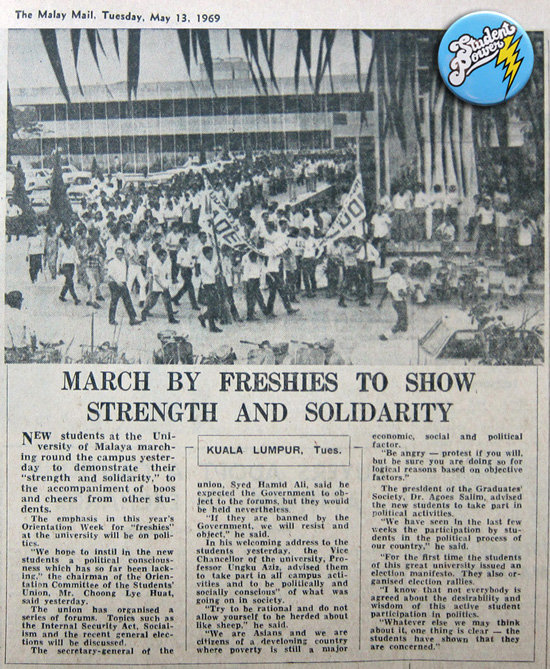
Outside campus, there was the Hamid Tuah incident. (In 1967, Malay peasant Hamid Tuah and his followers were arrested when they refused to leave the land in Teluk Gong that the Selangor government claimed they had been occupying “illegally”. The state destroyed their houses and crops without relocating them, hence leaving them homeless.)
We got involved, [protested, raised money and] collected food for them.
In the past, Umsu only focused on student welfare, but we went beyond that when we took up this cause. From then on, the committee members realised that we all shared the same aspirations, and our commitment [in Umsu] increased. Over the years, we became stronger.
Were you politically conscious before joining the students’ union?
Yes, my brother (Syed Husin) was already involved in Parti Rakyat, so he influenced me somehow. And when I was in Form 6, I lived with a Chinese couple who were my brother’s friends. I met a few people like Dr M K Rajakumar and Abdullah Majid who were involved in opposition politics. Although I wasn’t a party member, I followed their discussion sometimes.
But later Parti Rakyat became quite strong in UM. The head of PBMUM (Persatuan Bahasa Melayu UM) at that time, Sanusi Osman was also a Parti Rakyat member. And I was elected as the Pantai branch chairperson during my second year.
So students were allowed to join political parties at that time. But I heard, that was also the excuse used by some people to try to kick you guys out of the student council?
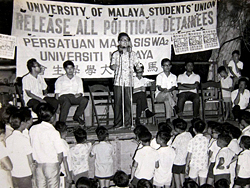
Yes, some people were unhappy because they didn’t want Umsu to be affiliated, as they claimed, with Parti Rakyat. And some accused us of being a “socialist group” so they tried to topple us. (Syed Hamid and Khong were among the founding members of UM Socialist Club.) So I stepped down, and Khong, Choong Lai Huat and the others also resigned together with me.
There was an election to elect temporary councillors to replace us but the students voted us back into the council. I think the [majority of the] students didn’t care whether we were socialist. What mattered was we never abused the union [for our own gain]. I think that’s why they reinstated us.
What about the 1969 general election? Why did you all decide to take part?
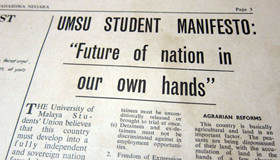
At first we thought we would put up a candidate. But then we thought we could not bring about much change if we put up a candidate because we would focus on one constituency only.
So we decided to go around the country to explain to the people their rights. Our manifesto covered almost everything, from the [abolition of the] ISA to freedom of assembly and association, to education reform and foreign policy.
We wanted the rakyat to support candidates who were willing to endorse our seven-point manifesto. Most opposition parties including Parti Rakyat and the Labour Party (of Malaya) endorsed it. But none from the Alliance except one MCA branch endorsed it.
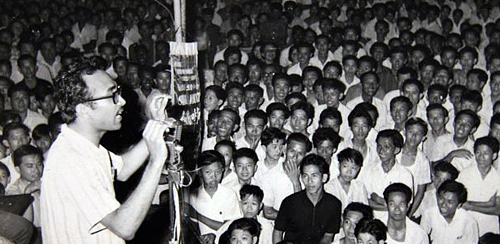
I think that was a big contribution from Umsu towards our country. You know the results of the 1969 general election. Penang fell to the opposition, Selangor and Perak also almost fell.
Did you face any opposition from your parents for participating in politics even though you were still a student?
I was fortunate because my parents trusted me. They believed we were mature enough to [make our own judgment]. I owe a lot to my parents; I never quite managed to repay them.
Did you graduate in the same year as Khong? What happened after that?
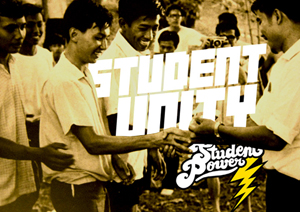
Yes, we graduated in the same year, but I continued to study for a Diploma in Education in UM for a year after that. I wanted to be a teacher, and because I received government financial aid for my studies, I was under contract to serve the government. But I later received a letter stating that they did not need my service.
I also won a scholarship from the Japanese government to study a postgraduate degree in rural economics in Tokyo, but the Malaysian government interfered and I couldn’t go in the end.
In 1975, I was about to leave for Australia and New Zealand for a lecture tour organised by the students there, but they seized my passport at Subang airport. That’s when I felt it was no longer safe to remain in the open.
Why did the government treat you that way?
It is a long story. After the 13 May riots, Tunku (Abdul Rahman) accused me of being the person responsible for a rally carrying the body of a Chinese [Malaysian] boy in Kepong a day before polling day. It was the body of a Labour Party member, Lim Soon Seng, who was shot dead by the police when he was putting up posters. But I was only there as a translator when the organisers applied for the permit for the funeral procession. Of course we also demanded for an explanation from the police [for Lim’s shooting].
The government has always blamed the opposition or the communist for the 13 May riots. So I think I was one of the scapegoats they found.
PBMUM, led by Anwar (Ibrahim), also pressured Tunku to resign after the riots. Umsu’s stand was different from them though. We thought, even if Tunku were to resign and Razak came into power, the system would remain the same. What we needed [wasn’t just a change in leadership, but] structural and systemic change within the government.
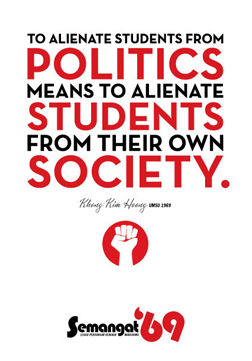
How do you think your experience as a student activist has impacted your life?
If I didn’t go through those days, I would probably have been a different person today, for better or worse I don’t know, but I don’t regret it.
I think it was something that many people don’t have the opportunity to experience these days [due to restrictions in the Universities and University Colleges Act (UUCA)]. It was a journey that has definitely affected my life. It’s difficult to judge good or bad, but I’m happy that I’m what I am today.
What about the current state of student activism?
The situation is different because there’s UUCA now. You can argue that during our time we had ISA, too and we fought against it but it’s difficult to judge.
But I believe students are an integral part of society. They should not and cannot be separated from society. They have the right to fight for justice and to be in politics; their struggle should be supported [by society]. ![]()
[related-posts]
The Nut Graph needs your support

